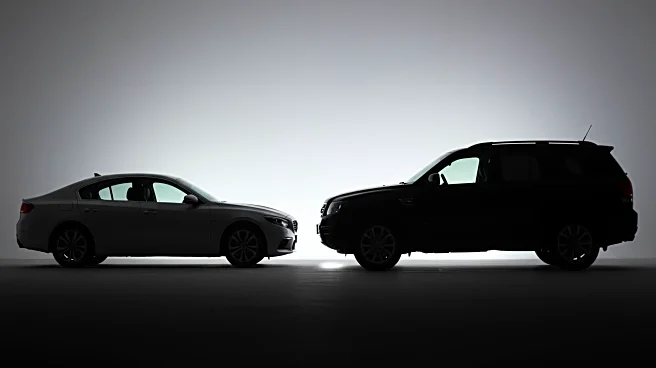What's Happening?
Several automakers are planning to discontinue a range of sedan models by 2026, as SUVs continue to dominate the U.S. automotive market. Among the sedans set to be phased out are the Acura TLX, Audi A4, BMW 8 Series Gran Coupe, Chevrolet Malibu, Genesis Electrified G80, Nissan Altima and Versa, Subaru Legacy, and Volvo S60 and S90. This marks one of the largest sedan die-offs in recent memory, with previous years also seeing significant reductions in sedan offerings. The shift is largely attributed to declining consumer demand for sedans, as evidenced by the dwindling sales figures for models like the Subaru Legacy and Acura TLX. Automakers are increasingly focusing on SUVs, which have shown stronger sales performance, such as Subaru's Crosstrek and Acura's RDX and MDX.
Why It's Important?
The discontinuation of these sedan models highlights a significant shift in consumer preferences and the automotive industry's strategic focus. As SUVs continue to capture a larger share of the market, automakers are reallocating resources to meet this demand, potentially impacting jobs and production strategies. This trend could lead to fewer options for consumers who prefer sedans, affecting the diversity of vehicle choices available. Additionally, the shift may influence the development of electric vehicles, as automakers adjust their plans to align with market trends. The decline in sedan sales also reflects broader changes in lifestyle and transportation needs, as consumers prioritize space, versatility, and perceived safety offered by SUVs.
What's Next?
Automakers are expected to continue phasing out sedan models in favor of SUVs and potentially electric vehicles. Acura, for instance, plans to replace the TLX with the all-electric RSX SUV, aligning with evolving consumer needs and industry trends. As the market adapts, further reductions in sedan offerings are anticipated, with reports suggesting that models like the Genesis G70 may also face discontinuation after 2027. The industry may also see adjustments in electric vehicle strategies, as automakers reassess their plans in response to market dynamics. Consumers can expect a continued emphasis on SUV models, with potential innovations in design and technology to cater to changing preferences.
Beyond the Headlines
The decline of sedans raises questions about the environmental impact of increased SUV production, given their typically larger size and fuel consumption. This shift may also influence urban planning and infrastructure, as cities adapt to accommodate larger vehicles. Additionally, the cultural significance of sedans, once a staple of American automotive identity, is evolving, reflecting broader societal changes in transportation and lifestyle. The industry's focus on SUVs could also affect the development of autonomous vehicles, as manufacturers prioritize models that align with consumer demand.









